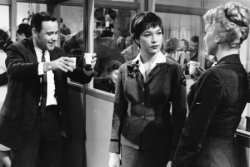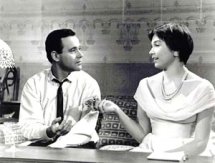Is It Really a Great Movie? Part One: The Apartment
by dan heaton

Using Roger Ebert’s Great Movies book as a guide, this series of articles will focus on all films included on his list that previously have escaped my notice. Since all lists are subjective, I am not treating Ebert’s choices as the essential selection of films. However, his essays offer the perfect chance for me to explore both classics and lesser-known pictures from around the globe.
My “great movies” series begins with Billy Wilder’s The Apartment (1960) – the biting workplace comedy that took home five Academy Awards in 1961, including Best Director and Best Picture. The 10 nominations also included recognition for actors Jack Lemmon, Shirley MacLaine, and Jack Kruschen. The American Film Institute has bestowed several major awards on this film, ranking it at #93 in the Top 100 films and #20 in the Top 100 comedies. Wilder is considered one of cinema’s great directors, and his catalog includes Some Like it Hot, Sunset Boulevard, and Double Indemnity. This all-star showcase has plenty of credentials to warrant its exalted status. Does it deserve the acclaim?
Prior to this viewing, I expected a clever comedy with fast-talking characters and romance, and essentially the movie follows this trend. However, it also contains several sad, stunning moments, including an attempted suicide, that do not appear in the typical crowd-pleaser. When the main character does the right thing at work, he pays the price for it and does not reach the expected place at the conclusion. The machine-like workplace is rife for satire, but it also presents the sad corporate environment that continues to exist today. The chauvinistic attitudes of the powerful executives are not as evident in 2006, but they certainly still exist in most offices. Even the apartment itself is a depressing haven of bachelorhood that displays little life beyond the nefarious activities.

The Apartment stars Jack Lemmon as C.C. Baxter – an ambitious insurance analyst determined to rise quickly in the corporate world. Unfortunately, his method for attaining this goal involves lending his apartment to the bosses for their extramarital affairs. Their uncaring trysts also interfere with his sleep and ability to relax at home between long work days. C.C. is not a bad guy and clearly isn’t thrilled about the situation, but he also won’t say no even when the situation is extremely inconvenient. The other apartment dwellers are stunned by his apparently constant party-going, which involves wild visits from ladies at all hours of the night. These residents include Jack Kruschen’s Dr. Dreyfuss, who crafts a likable character and plays a key role late in the film.
My impressions of Jack Lemmon have been shaped too much by his recent roles in light comedies like the Grumpy Old Men films, My Fellow Americans, and Out to Sea. Catching him in his mid-30s as C.C. Baxter reminds me about just sharp he can be. Lemmon makes a possibly unlikable character amiable and has good fun conveying his sorry state. Another actor who I’ve rarely seen as a young woman is the striking Shirley MacLaine, who performs very well as elevator operator Fran Kubelik. Her recent work includes Rumor Has It, In Her Shoes, and Bewitched, and none have attracted my attention. As Fran, she injects both confidence and emotional pain into the complex role. Involved in a doomed affair with the married big boss Jeff D. Cheldrake (Fred MacMurray), she struggles to end the relationship but can’t overcome her feelings. MacMurray’s boss is an arrogant cad with few redeeming qualities, but he also can be charming when the situation dictates. The actor is best known for his roles in Disney films like The Absent-Minded Professor and the television series My Three Sons, and this earlier role will surprise fans of his family work. It stands closer to his performance in Wilder’s Double Indemnity, which also showcased MacMurray involved in troubling behavior.
Filmed in striking black and white, The Apartment might draw a hesitant response from viewers trying to avoid a “dated” movie. In similar manner to his other classics, Billy Wilder’s energetic writing generates a timeless quality that keeps the films relevant today. Working with I.A.L. Diamond (Some Like it Hot), he crafts an often sad tale with plenty of sharp dialogue to keep the story moving. Although the gender makeup of the workplace has been adjusted significantly in the past 45 years, the characters’ plights are still understandable. The feelings and actions of C.C., Fran, and Jeff are convincing and will draw an emotional response from modern viewers. The pacing might be a bit slow and take a while to get moving, but the sharp writing keeps us watching until the plot starts rolling.
In his review of The Apartment, Roger Ebert correctly describes the melancholy state of its lead characters and their unfortunate place in the corporate world. Beneath the trappings of a standard romantic comedy is a more poignant look at the nastiness involved in business and personal dealings among people. In terms of “great movies,” this film makes a strong case for inclusion in my own personal list, but falls just short of being a masterpiece. In terms of Wilder’s work, it falls behind the depressing tragedy of Sunset Bouelvard and the lively insanity of Some Like It Hot. However, both Jack Lemmon and Shirley MacLaine deliver excellent performances that stand the test of time and stand among their best work. While my agreement with its great movie status is only mild, The Apartment surely deserves a Netflix rental or a viewing on Turner Classic Movies. The story provides a moving, enjoyable experience that definitely warrants two hours of your time.
Copyright (c) 2006 erasing clouds |
|